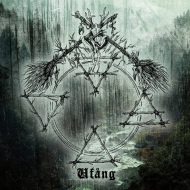 Perchta, founded as recently as 2017, are from Tyrol, Austria, and named after a figure from Germanic folklore, also considered a goddess in Alpine paganism. Frau Perchta was, among other things, the upholder of cultural taboos. She was said to roam the German and Austrian Alpine region from Christmas Day to Epiphany, unforgivingly punishing those who did not behave according to the rules and generously rewarding the good folk. To those who misbehaved she would appear as a frightening old hag, to the deserving ones as a radiant beauty. Punishment for misbehaviour was sever and gory: She would slit bellies open, remove stomach and guts and stuff the remaining cavity with straw. The cult of Perchta was alive until the 15th century, when the Catholic church put an end to it.
Perchta, founded as recently as 2017, are from Tyrol, Austria, and named after a figure from Germanic folklore, also considered a goddess in Alpine paganism. Frau Perchta was, among other things, the upholder of cultural taboos. She was said to roam the German and Austrian Alpine region from Christmas Day to Epiphany, unforgivingly punishing those who did not behave according to the rules and generously rewarding the good folk. To those who misbehaved she would appear as a frightening old hag, to the deserving ones as a radiant beauty. Punishment for misbehaviour was sever and gory: She would slit bellies open, remove stomach and guts and stuff the remaining cavity with straw. The cult of Perchta was alive until the 15th century, when the Catholic church put an end to it.
The press info for the band and their debut album Ufång (beginning), mentioning some of the above, had me intrigued straight away. I immediately went and checked out the video to the pre-released track Atem (breath) and found it pretty impressive. It featured breath-taking alpine scenery in black and white, a witch-like protagonist and music borrowing from folk, traditional metal and black metal with lyrics in an Austrian dialect. I liked very much what I saw and heard. But, as it is sometimes the case, the album proved not to be entirely what I had expected. While there is metal involved here, it’s more of a traditional than a black kind, and pretty much half of the tracks are folk music.
The album opens with an intro that sets the scene. Frau Perchta is arriving in her realm. You hear someone softly walking on natural ground, maybe on dry fir needles. A cittern, a traditional stringed instrument, is played, and there is also the sound of bells and that of a wind instrument to be heard. Erdn (earth), the next track, after a beginning in the style of the intro, has fast drumming, melodic guitars and throaty, male vocals. So far, so good.
The third track Langs is the first surprise, because it is mainly cittern music and female vocals. And that is true for half of the album. But since the lyrics are entirely kept in an Austrian dialect, you can’t understand all that much of what is sung, even if you know German.
Langs is followed by my favourite track on the album, Atem. You should definitely give it a listen, preferably via the impressive video, because here folk, traditional metal and black metal combine to something quite special. The same is true to some extent for Gluat. However, Gluat starts out with a more familiar neo folk sound in the style of the German band Hekate, with medieval instruments and percussion, and later turns into traditional metal and black metal. Wassa, on the other hand, has an epic touch, with soaring guitars and vocals.
While the tracks with only cittern and vocals make for a somewhat challenging listening experience, Ufång is nevertheless worth exploring. Since it is obviously a concept album, telling a story about the band’s cultural and musical origins, it is inherently justified in its composition. If this is the beginning, I am curious to see where the band is headed.
I’d like to conclude with a suggestion for you regarding context: Since we’re also a film site, and since many of you are at home with a lot of spare time on your hands, you could check out two movies that are also set in the German Alpine region, just as the album at hand. One is Hagazussa (2018), the other Tannöd (The Murder Farm, 2009). The first one we also reviewed here, and it is a movie that will be appreciated by experienced horror film fans, the other will suit a somewhat broader audience.
(7.5/10 Slavica)

Leave a Reply